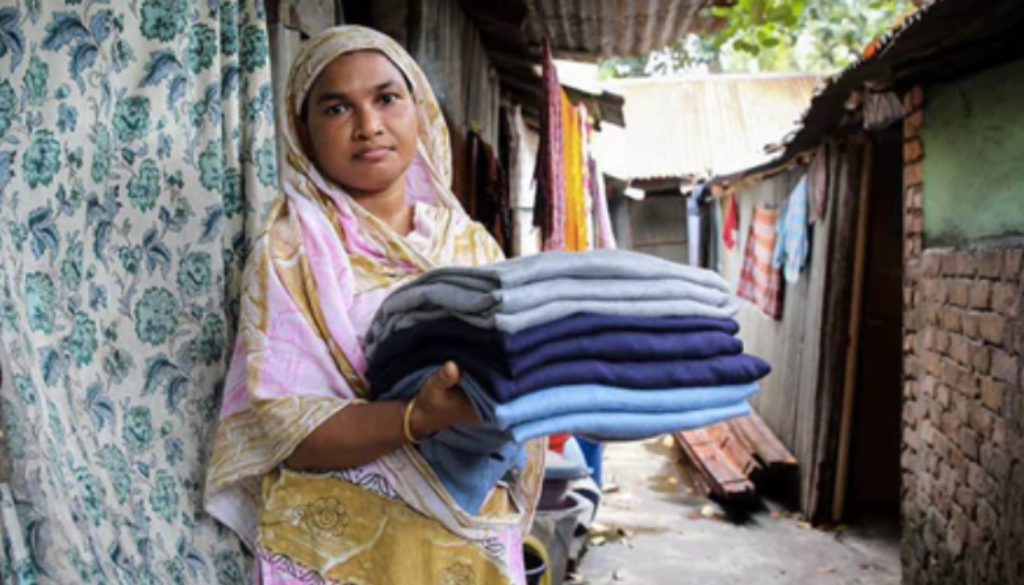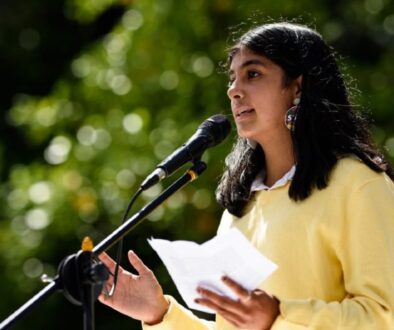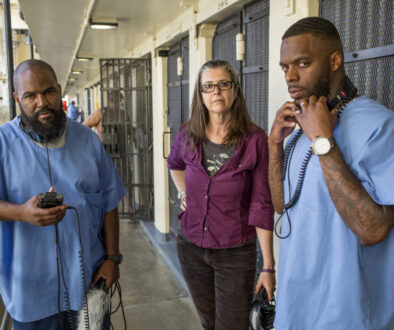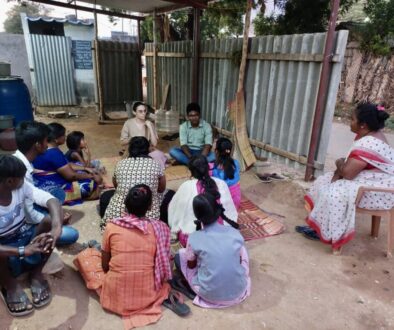Oxfam is Giving YOU the Power to Change What She Makes

This article was originally published in the Humanitarian Changemakers Network’s Changing Times news, written by Jess.
Jess works for Oxfam Australia as a campaigner and community organiser, and also works on the digital team. She first got involved as a volunteer activist in 2010 and has been with Oxfam ever since! While she loves all of the work Oxfam does, she is especially passionate about refugee rights, migration, and people seeking asylum.
Since the tragic Rana Plaza collapse killed over 1,100 people in 2013, there has been a huge focus on the often-dangerous working conditions in clothing factories around the world. But there’s another side to the story – that after working long hours, in poor conditions, the women who make our clothes still aren’t being paid enough to pay for the basics of life. In fact, it’s estimated that just 2% of all people in garment supply chains are paid a living wage – the minimum all working people should be paid if they are to escape the cycle of poverty.
Right now, big brands are part of a system that pays poverty wages. The clothing industry in Australia was worth a whopping $23.5billion in 2018, and has been growing year-on-year, meaning that many big brands’ revenue is growing as well. Furthermore, research by Deloitte Access Economics found that if brands were to pay a living wage it would increase the cost of their clothing by an average of just 1%. This is a small price to pay for doing the right thing, and considering business is booming, it’s clear that retailers, wholesalers and manufactures have enough room to absorb the cost of paying a living wage.
Behind these shocking numbers sits the stories of the women who are making our clothes. Women like Anju, who Oxfam spoke to when the What She Makes campaign first launched. She was working in Dhaka, Bangladesh, making clothes for Australian brands. Like many women in the garment industry, she is paid poverty wages. Anju does skilled work, for long hours, but the poverty wages paid by big Australian brands are just not enough to pay for even the basics of living. In fact, she is so underpaid that she can’t afford for her two young daughters, Munia, aged 10 at the time and Ginia, 8, to live with her, instead sending them to stay with their grandparents in her home village. She only sees her daughters twice a year.
“If I had a better wage, I could have my daughters near me.” Anju told us. “I could keep them here and take them out to visit places; take them out for a day.”
It doesn’t have to be like this. Big brands make big money and they must do the right thing and pay a living wage. A living wage is not a luxury or a privilege, it is a universal human right for every working person around the world, including the women who make our clothes.
Here at Oxfam, we’re calling on the companies behind the lea- ding and iconic Australian fashion brands to commit to paying a living wage to the workers making their clothes – and to publish a step-by- step strategy outlining how and when this will be achieved. Brands have the power and the responsibility to ensure the workers who make their clothes can live decent lives and lift themselves out of poverty. We are also calling for Australians to join us, and the women who make their clothes, and speak up, demanding better of the brands they know and love.
The What She Makes campaign launched in 2017 and Oxfam uses a number of different approaches to ensure a living wage is paid to the women who make our clothes. Firstly, we work behind closed doors with brands, educating them about what a living wage is and how they can achieve it in their supply chains. We also conduct new re- search, share facts and – most importantly – amplify the stories of the women who make our clothes to the public so they understand the issue at hand. And we’re mobilising people to call out the brands who haven’t yet done the right thing. To date, many brands have made a real commitment to a living wage thanks to pressure from the 130,000+ people who have taken action with the campaign so far. Kmart, Target, Cotton On, City Chic, Elk, Best & Less, Pas Group (which owns Review, Designworks and more) and Factory X (which owns Gorman, Dangerfield, Alan- nah Hill and more) have all published a commitment to a living wage and a timeline for next steps. But there is still more work to be done – and more you can do to get involved.
We’ve been taking part in two kinds of activism that are a little different to what you may have seen before. Firstly, we are hand-writing letters to big brands, describing the situation to them and politely asking that they do the right thing and pay a living wage. Letter writing is a lovely group activity that can appeal to all ages – from little kids, to well beyond retirement – and it is as community-building as it is influential. Brands don’t typically get handwritten letters from customers, let alone letters adorned with glitter-glue, poetry and power- ful stories of women making clothes for the Australian market. We have all the advice you need to host your own letter writing party – it’s fun, you can do it with your own friends in your own time, and we know it has a big impact on brands.
The second thing we’re doing are doorhanger actions. These are a little cheekier – but just as fun and powerful at influencing brands. We’re popping into the change rooms of big brands who have not made genuine commitments to pay a living wage, leaving behind a #WhatSheMakes doorhanger, snapping a photo and sharing it for the world to see – tagging the brand on Instagram and sharing on the Oxfam page. Leaving doorhangers behind in change rooms is legal and non-confrontational – and we know that it sends a strong message to these big brands. Again, we have all the materials you need to run your own doorhanger action, and our team is there to support you every step of the way.
However you get involved, the most important thing is to remember that your voice is powerful. Together, we can stand with the women who make our clothes and demand big brands pay a living wage.
Love this article?
We think you’ll also like:
Humanitarian Changemakers Network founder, Tiyana J, worked on the Oxfam What She Makes Campaign, when she first began her journey in campaigning for change…
The post Oxfam is Giving YOU the Power to Change What She Makes appeared first on Changemaker Co..




